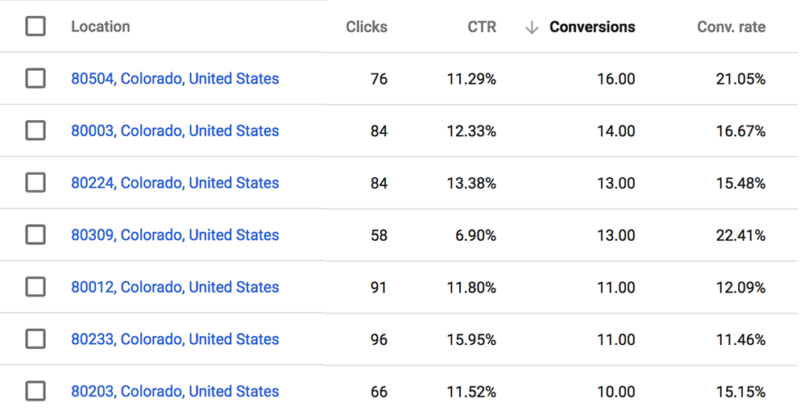 If a company has multiple brick-and-mortar locations within a city or metropolitan area, this can create challenges in advertising overlap, self-competition and ad relevance.
If a company has multiple brick-and-mortar locations within a city or metropolitan area, this can create challenges in advertising overlap, self-competition and ad relevance.
This article will focus on lessons learned to manage a pay-per-click (PPC) program for a dental provider with multiple offices located across a multistate region and will illustrate the benefit of moving from a city or region PPC targeting strategy to a ZIP code approach.
Limited performance
Initially, the company utilized paid search to cast a broad net across each city or metro area where they have an office.
In reviewing the account and geographic results, we discovered there were specific ZIP codes within the region that received stronger click-through rates and conversions. Since the budget was evenly distributed across the entire city or region, this limited performance to these top-performing ZIP code targets and distributed too much of the budget to lower-performing areas.
Here is an example of this ZIP code analysis:

We also had the opportunity to compare ZIP-code PPC performance to the company’s new patient acquisition data. We were able to verify that a greater portion of new patients did indeed come from these high-performing PPC ZIP codes.
Taking it one step further, we identified that new patients were often located within a three-mile radius of each practice location. This provided some valuable insights in terms of bid adjustments based on searcher location.
Bid adjustments
Based on our findings, we optimized each campaign by utilizing bid adjustments to prioritize ads serving to top-performing ZIP codes.
Implementation tactics included increased bid adjustments for ZIP codes that historically provided stronger click-through rates, conversions and new patient acquisitions for the client. We also reduced bid adjustments for ZIP codes which were still relevant for targeting yet did not provide strong results.
Here is a sampling of the bid adjustments:

The campaigns were also enhanced with the addition of keywords with top-performing ZIP codes as modifiers. This included keywords such as +dentist +80504 to capture granular and more tightly focused search traffic. ZIP-code bid adjustments improved relevance and performance across all optimized markets.
Improvements
Comparing results (for a 90-day period before and after bid and keyword optimizations), we saw significant improvements across all of our optimized ZIP code campaigns. This included:
- Conversion rate increase of 212 percent.
- 13 percent decrease in average cost per click (CPC).
- 4 percent increase in average click-through rate (CTR).
- Cost per conversion decrease of nearly 60 percent.
Here are a few charts showing these improvements:

Summary
Moving from a city optimization strategy to a more granular ZIP code approach allowed us to better adjust bids (based on proximity to office), serve more relevant ads, improve program efficiency and more effectively allocate budget.
This, in turn, led to improved conversion and the acquisition of additional patients.
I urge digital marketers who manage multilocation campaigns to analyze results by ZIP code and test a granular optimization approach in terms of keywords, budgets and bids.
Contributing authors are invited to create content for Search Engine Land and are chosen for their expertise and contribution to the search community. Our contributors work under the oversight of the editorial staff and contributions are checked for quality and relevance to our readers. The opinions they express are their own.



